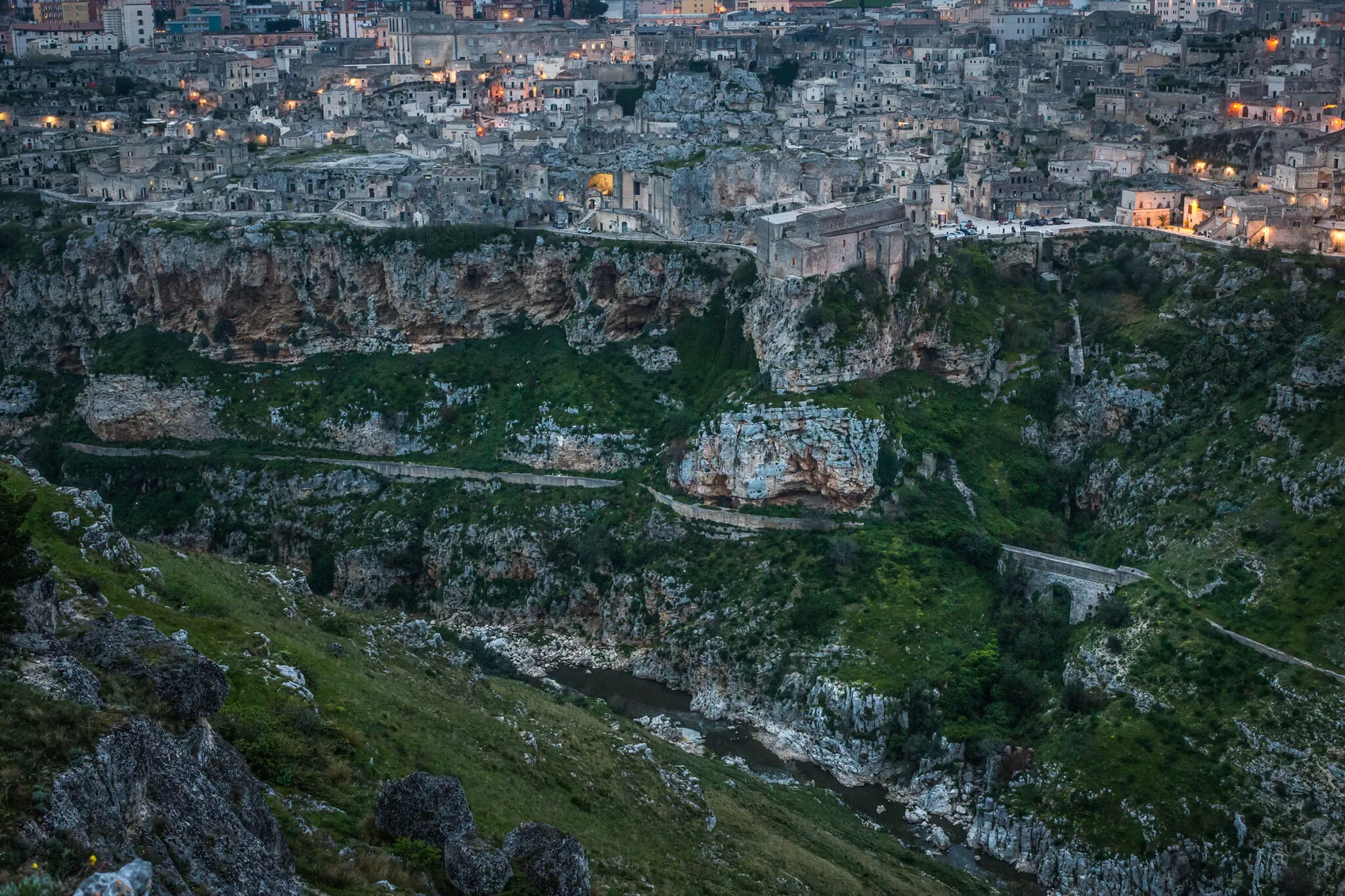
- Blancaneaux Lodge • Belize
- Turtle Inn • Belize
- La Lancha • Guatemala
- Jardin Escondido • Argentina
- Palazzo Margherita • Italy
- All-Movie Hotel • USA
“The future is unforeseen…do not leave to chance future happenings, but rather do all you can today to make your future be better.”
– Horace, the great Roman lyric poet born in Venosa (Basilicata), from his masterpiece Carpe Diem.
Matera is a UNESCO World Heritage Site renowned for its Sassi districts, which are outstanding examples of a rupestrian (rock-cut) settlement. Matera is the most marvelous, intact example of a Paleolithic settlement in the Mediterranean region. It is one of the oldest cities in the world, since it has been continuously inhabited since prehistoric times.
The Sassi district is divided into two parts, the Sasso Caveoso and the Sasso Barisano. It contains countless rupestrian churches and is considered the gem of Basilicata.
Matera is, our top suggestion, a no missing town to visit with the help of a tour guide.
This Park, together with the Sassi District, has been on the World Heritage List since 1993. It stretches over the Murgia, a calcareous highland plateau characterized by deep fault fissures, ravines, rocks and caves.
Guests will have exclusive access to a private area of this spectacular rocky landscape which best witnesses the harmonious integration between man and natural ecosystem in Southern Italy.
An historian of the Rupestrian archeology civilization will lead the guests through a beautiful old path until the top of a hill of the ancient Murgia. Once there, they will have an unforgettable “Aperitivo” next to an ancient shepherd’s little house, admiring the breathtaking view of millennial caves and the deep canyon that designed this part of the park. After this nice stop, one of the most interesting Rupestrian Churches in the whole archeological site of Matera will be opened exclusively for our guests.
Craco, one of the most famous ghost towns in Italy, is located on a hill 390 meters above sea level. It sits on top of a cliff and gullies that characterize the hilly area of the Lucanian Apennines, and is surrounded by the “Calanchi Lucani”.
The town is characterized by spontaneous architecture with cut-out craft in stone and brick. The stone houses are intertwined around the castle which overlooks the entire village from the top of the cliff.
Craco was permanently evacuated in 1963 when a landslide affected the safety of the entire medieval village. The abandonment of the old houses transformed the area into a ghost town now often used as a film set for historical films.
Afterwards, driving through this lunar landscape guests will reach Aliano, another little mystical village where Carlo Levi’s classic book “Christ Stopped at Eboli” was set. The novel provides unique insights into rural conditions in a village in Basilicata, Southern Italy, in the 1930s.
The Park stretches along a large area located in the hearth of Basilicata, which has important naturalistic, historical, and ethno-anthropological values.
Guests will walk through the paths of the park and visit the wonderful mountain
villages of Castelmezzano and Pietrapertosa. These little towns are opposite each
other, separated by a valley which is suited to passionate hikers. A 5 kilometer-path
crosses it, connecting the two villages. It is possible to walk it with the assistance of a guide.
During the summer season, guests will also have the chance to experience the Angel Flight: tied to a steel cable, suspended between the peaks of the two villages, they will fly at 120 km/h, crossing the valley below.
Our guests will follow a specially trained dog in a protected forest of oaks, cerros and beechs, searching for the precious gems of the soil: black and white truffle!
The experience is completed with a unique wine tasting in the setting of a medieval cave cellar overlooking
the beautiful hills. Here guests will have the opportunity to taste some of the local organic products … and of course fresh truffle shaves on eggs, cooked on a stone!
Within 15 minutes from the Palazzo, many miles of sandy beaches extend along the cobalt- blue shores of the Ionian Sea.
We have a special private area of a beach club close to the old pine forest. We offer guests transport to this secluded beach for the day (departure at 10:30 am in the morning and return at 4:00 pm to Palazzo Margherita) and they can choose to book either an umbrella or a gazebo. In addition, we suggest either a picnic lunch (prepared by our chefs) or a lunch at the
beach club’s restaurant with fresh fish of the day, caught by local fishermen.
This could be combined with a guided tour of the ghost town of Craco (30 min. drive), or with a visit to the Greek archeological sites of Metaponto and Policoro.
Guests will visit the Hera Temple and the Greek Ruins in Metaponto, just a 20 minute-Drive from the Palazzo. The close-by Ionian Coast is known to be a former Magna Graecia colony.
There are also two archeological museums: one is in Metaponto, very close to the Hera Temple; the other is in Policoro, 35 mins drive from the property. If they just want to see the Temple, a guide is not necessary. If instead they would like to make a complete tour of both the archeological sites and a museum, we recommend the assistance of a guide.
For wine lovers, we suggest a visit to a couple of wine estates with their historical cellars, located in the northern part of Basilicata. The area is famous for the production of the Aglianico red wine, one of the most prestigious of Southern Italy. It owes its name to the term Elleanico (in Italian it means Greek), that during the Government of Aragon changed the pronunciation.
During the tour, guests will taste some wine labels, accompanied with typical delicatessen.
It is possible to complete the experience with a guided tour of the close-by Venosa, hometown of the Roman poet Horatius.
The area of Salento, in the southern part of Puglia, is known for the production of the “Primitivo di Manduria” red wine.
The origins of Primitivo wine are uncertain. They think it is have been brought
to Puglia region during the Phoenician colonization or even before, by the
Illyrians more than 2000 years ago. Others, claim that the Benedictine monks
from Burgundy were who introduced the vine of Primitivo in the seventeenth century. In any case, we know for sure that the vine was known by this name since the end of the 18th century.
Guests will visit a vast wine estate in the area, very close to the Ionian Sea. The visit is completed with a light lunch and a tasting of the excellent Primitivo.
On the way back to Palazzo Margherita, they could stop and visit the ceramic district in Grottaglie, with many artisanal workshops.
After a visit to the town of Martina Franca, guests will follow a road through the valley that will allow them to enjoy the most beautiful view over the well known Trulli, the cylindrical houses with a cone roof. Guests will admire this fabulous landscape and will visit other characteristic towns in the area, such as the white city of Ostuni or Locorotondo, where they could stop for lunch in a typical trattoria.
We can always propose a visit to the more popular town of Alberobello, even if in the high season and during the weekend we don’t suggest it.
Also known as the city of ceramics, Grottaglie is located in an area rich in clay. Since the 18th century it has been very active in the production of ceramics. The ceramic district will allow guests to visit several artisanal workshops.
Also the Museum of Ceramics is a must-see when visiting Grottaglie. It is located inside a 14th century castle, allowing guests to experience both the history and art of ceramics.
This is a trip that will ensure you leave with amazing images and adventures.
With views that span thousands of years of human history, along with neolithic monuments, this is as much an expedition through time as it is through landscape photography. Capturing images from the ancient Matera, the Calanchi (Badlands), ghost towns and stunning landscapes.
Working directly with Gundolf, during your journey across this incredible part of Italy, you’ll be treated to stunning locations, amazing experiences and down-to-earth photographic tuition which will ensure you to capture fine art prints that you’ll be proud to display for all to see, as well as memories that will last a lifetime.
Staying in our luxury accommodation up-close to our shoot locations, we’ll incorporate landscape, panoramic, long exposure and night photography into your custom workshop itinerary, delivering a portfolio of your own stunning images that will be truly unique and special to you.

